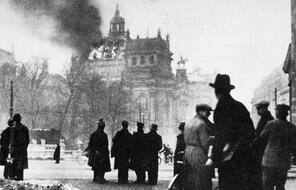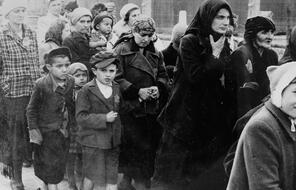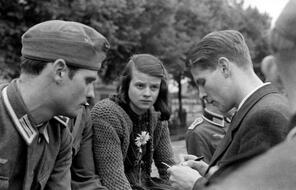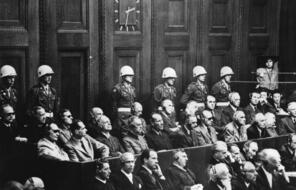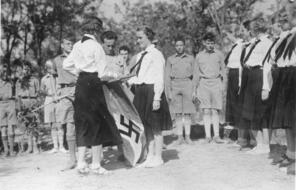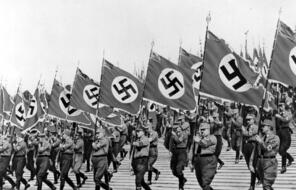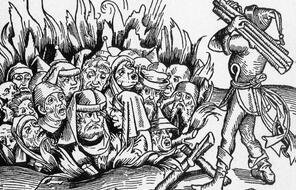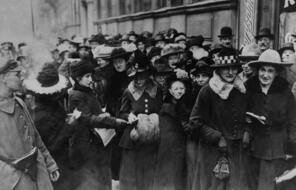Antisemitism and Jewish Identity
At a Glance
Language
English — USSubject
- History
- Human & Civil Rights
- The Holocaust
The growing antisemitism in Germany in the 1920s had a profound effect on Jews throughout the country. Many had taken pride in being German and saw their nationality as an integral part of their identity. Now antisemitism led many Jews to reassess their identity. Among those individuals was Ernst Toller, who wrote:
I was born and brought up in Germany; I had breathed the air of Germany and its spirit had molded mine; as a German writer I had helped to preserve the purity of the German language. How much of me was German, how much Jewish? I could not have said . . .
The words, “I am proud to be a German” or “I am proud to be a Jew,” sounded . . . stupid to me. As well say, “I am proud to have brown eyes.”
Must I then join the ranks of the bigoted and glorify my Jewish blood now, not my German? Pride and love are not the same thing, and if I were asked where I belonged I should answer that a Jewish mother had borne me, that Germany had nourished me, Europe had formed me, my home was the earth, and the world my fatherland. 1
Influential psychologist Sigmund Freud also reassessed his identity. In 1926, the Austrian native told an interviewer, “My language is German. My culture, my attainments are German. I considered myself German intellectually, until I noticed the growth of antisemitic prejudice in Germany and German Austria. Since that time, I prefer to call myself a Jew.” 2 It was a revealing comment from a man who did not believe in God or organized religion.
Arnold Schoenberg took an even stronger stand. Schoenberg was a world-famous composer who converted from Judaism to Christianity in 1898, when he was in his twenties. In 1923, artist Wassily Kandinsky sent him an invitation to join the faculty at the prestigious Bauhaus school of design in Weimar. Kandinsky noted in his letter that Jews were not normally welcome at the Bauhaus, but an exception would be made for Schoenberg. The outraged composer replied:
[W]hen I walk along the street and each person looks at me to see whether I’m a Jew or a Christian, I can’t very well tell each of them that I’m the one that Kandinsky and some others make an exception of, although of course that man Hitler is not of their opinion. And then even this benevolent view of me wouldn’t be much use to me, even if I were, like blind beggars, to write it around my neck for everyone to read. . . .
I ask: Why do people say that the Jews are like what their black-marketeers are like?
Do people also say that the Aryans are like their worst elements? Why is an Aryan judged by [great Germans like] Goethe, Schopenhauer and so forth? Why don’t people say the Jews are like Mahler, Altenberg, Schoenberg and many others? 3
Schoenberg then reprimanded Kandinsky for daring to “‘reject me as a Jew.’ Did I ever offer myself to you? Do you think that someone like myself lets himself be rejected! Do you think that a man who knows his own value grants anyone the right to criticize even his most trivial qualities? Who might it be, anyway, who could have such a right?”
Schoenberg ended his letter by warning, “But what is antisemitism to lead to if not to acts of violence? Is it so difficult to imagine that? You are perhaps satisfied with depriving Jews of their civil rights. Then certainly Einstein, Mahler, I, and many others will have been got rid of. But one thing is certain: they will not be able to exterminate those much tougher elements thanks to whose endurance Jewry has maintained itself unaided against the whole of mankind for twenty centuries.” 4
Connection Questions
- Make an identity chart for Ernst Toller. How did he see himself? Where did he feel he belonged? How do you think his identity would have been seen by Nazi supporters?
- How did the climate of antisemitism influence the ways Sigmund Freud and Arnold Schoenberg saw themselves?
- What does Schoenberg mean when he writes, “But what is antisemitism to lead to if not to acts of violence?” How would you answer the question? How are racism and violence linked?
- How can your environment lead you to prioritize different parts of your identity at different times? How does feeling like an outsider affect the way you define yourself?
- 1Ernst Toller, I Was a German: The Autobiography of Ernst Toller (Paragon House, 1991), 285–86.
- 2Quoted in Peter Gay, Freud: A Life for Our Time (New York: Norton, 1998), 448.
- 3Arnold Schoenberg, Letters, ed. Erwin Stein, trans. Eithne Wilkins and Ernst Kaiser, quoted in Frederic V. Grunfeld, Prophets Without Honor: A Background to Freud, Kafka, Einstein and Their World (Holt, 1979), 175–76.
- 4Arnold Schoenberg, Letters, ed. Erwin Stein, trans. Eithne Wilkins and Ernst Kaiser, quoted in Frederic V. Grunfeld, Prophets Without Honor: A Background to Freud, Kafka, Einstein and Their World (Holt, 1979), 175–76.
How to Cite This Reading
Facing History & Ourselves, "Antisemitism and Jewish Identity," last updated August 2, 2016.


